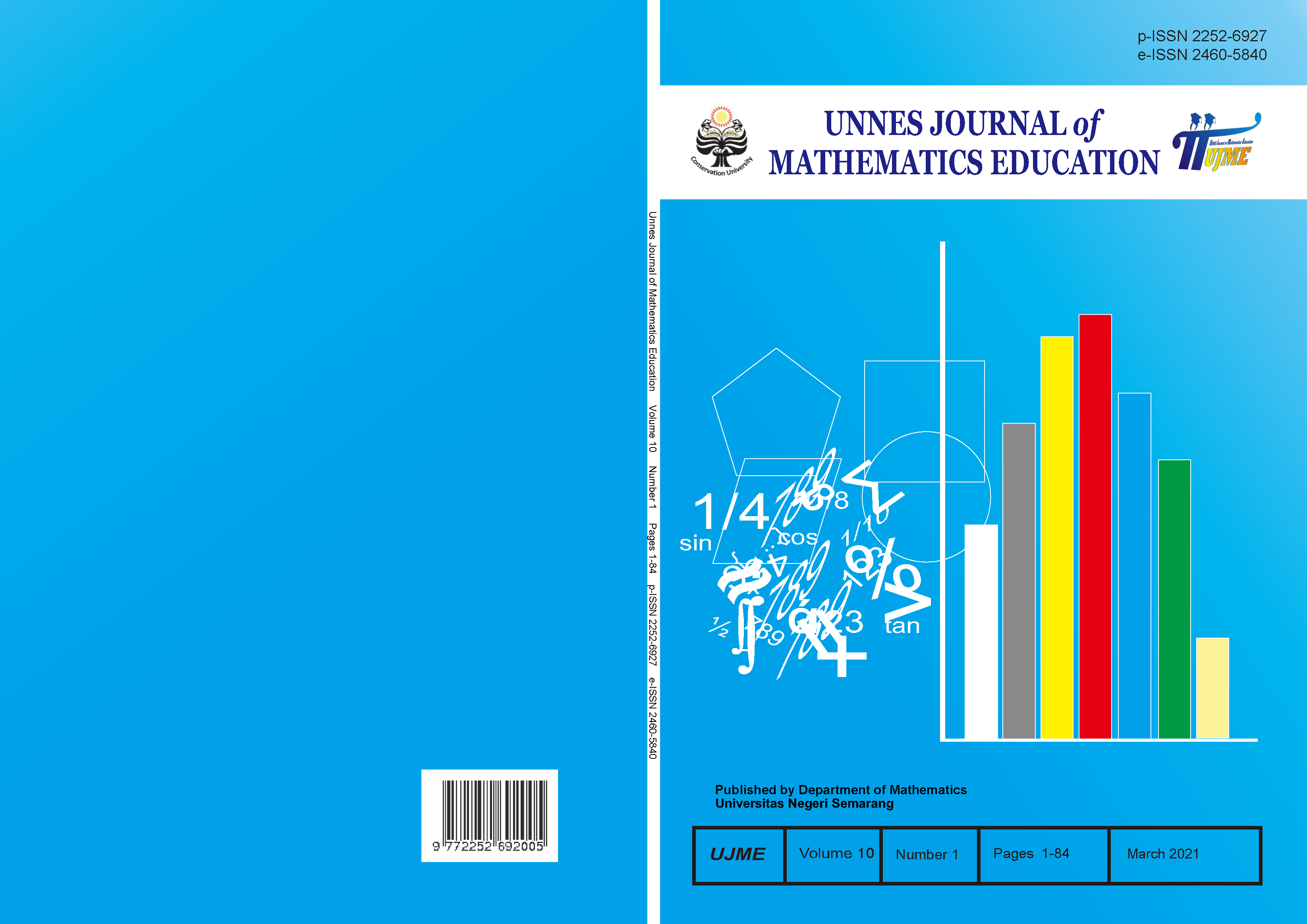Description of Van Hiele's geometry thinking ability in solving open ended problems in the 7E-Learning Cycle in terms of self efficacy
##plugins.themes.academic_pro.article.main##
Abstract
Provision of geometry material carried out at several levels of education confirms that the burden of children's knowledge in receiving different geometry material is adjusted to the ability of children at each stage. This agrees with the theory of geometry thinking conveyed by Van Hiele. One of the constructivism learning models that is expected to be able to improve problem solving skills in students, including the 7E Learning Cycle model. The purpose of this study is (1) to describe the development of Van Hiele Geometry thinking skills in students in solving open ended problems in 7E Learning Cycle learning, and (2) describe the Van Hiele Geometry thinking skills of students in solving Open Ended problems in terms of Self Efficacy in learning 7E Learning Cycle. The population in this study were students of class IX Junior High Schoolof 2 Kudus. Sampling was done by using purposive sampling technique, 6 subjects were selected, with 2 subjects for low self efficacy, 2 subjects for medium self efficacy and 2 high self efficacy subjects from class IX A as the experimental class.
##plugins.themes.academic_pro.article.details##
References
Bandura, A. (1994). Self Efficacy. New York: Academic Press.
Bandura, A. (1977). Analysis of Self-Efficacy Theory of Behavioral Change. Journal for Cognitive Therapy and Research, 1(4), 287-310.
Bandura, A. Self Efficacy in Changing Societies. New York: Cambridge University Press.
Burger, W. F., & Shaughnessy, J. M. (1986). Characterizing the van Hiele levels of development in geometry. Journal for research in mathematics education, 17(1), 31-48.
Damaryanti, D., Mariani, S., & Mulyono, M. (2017). The Analysis of Geometrical Reasoning Ability Viewed from Self-Efficacy on Connected Mathematic Project (CMP) Learning Etnomathematics-Based. Unnes Journal of Mathematics Education, 6(3), 325-332.
Darojat, L., & Kartono. (2016). Kemampuan Pemecahan Masalah Siswa dalam Menyelesaikan Soal Open Ended Berdasarkan AQ dengan Learning Cycle 7E (Students’ Problem Solving Ability In Solving Open Ended Problems In Terms of AQ with 7E Learning Cycle). Unnes Journal of Mathematics Education Research, 5(1), 1-7.
Eisenkraft, A. (2003). Expanding the 5 E Model A purposed 7 E model emphasizes “transfer of learning†and the importance of eliciting prior understanding. National Science Teachers Association, 1840 Wilson Blvd., Arlington, VA 22201-3000.
Moleong. (2011). Metodologi Penelitian Kualitatif (Qualitative Research Methods). Bandung: PT Remaja Rosdakarya.
Muarifah, A. (2016). Analisis Keterampilan Geometri Siswa dalam Menyelesaikan Soal Geometri Segiempat Berdasarkan Tingkat Berpikir Van Hiele (Analysis of Students’ Geometrical Skill In Solving Equilateral Problems In Term Of Van Hiele’s Thinking Level). (Undergraduate’s Thesis). Semarang State University.
NCTM. (2000). Principles and Standards for School Mathematics. America: The National Council of Teachers of Mathematics, Inc.
Ruslan, A. S., & Santoso, B. (2013). Pengaruh Pemberian Soal Open Ended Terhadap Kemampuan Penalaran Matematis Siswa (The Impact of Given Open Ended Problems on Students’ Mathematical Reasoning Ability). Kreano. 4(2), 138-150.
Sefiany, N., Masrukan, Zaenuri. (2016). Kemampuan Komunikasi Matematis Siswa Kelas VII Pada Pembelajaran Matematika Dengan Model Knisley Berdasarkan Self Efficacy (7th Grade Students’ Mathematical Communication Ability in Knisley Model In Terms Of Self Efficacy). Unnes Journal of Mathematics Education, 5(3), 227-233.
Sugiyono. (2015). Metode Penelitian (Research Methods). Bandung: Alfabeta.
Tyas, M.A., Mulyono, Sugiman. (2015). Keefektifan Model Pembelajaran Learning Cycle 7E terhadap Minat Belajar dan Pemahaman Konsep Matematika Kelas X (The Effectivity of 7E Learning Cycle Models On 10th Grade Students Motivation and Mathematical Concept Understanding). Unnes Journal of Mathematics Education, 4(3), 258-264.
Villiers, M. (2010). Some Reflections on the Van Hiele Theory. The 4th Congress of Teachers of Mathematics of the Croatian Mathematical Society. Zagreb.
Wena, M. (2009). Strategi Pembelajaran Inovatif Kontemporer: Suatu Tinjauan Konseptual Operasional (Cotemporary Innovative Learning Strategy: An Operational Conceptual Study). Jakarta: Bumi Aksara.
